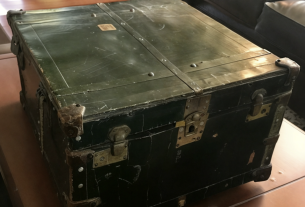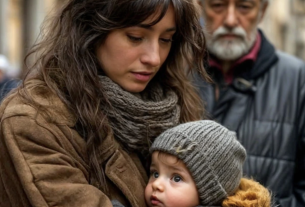Little Artyom was peacefully snuffling in his crib, his tiny fist tucked under his rosy cheek, while I looked at him and thought about how little it sometimes takes for life to change its course completely. Just one phrase can destroy what seemed like a strong relationship and open your eyes to a person’s true nature. Who would have thought that a baby crib would become the last straw to tip the scales? Yet sometimes the most ordinary things turn into symbols of betrayal, and love proves not to be as unconditional as it once seemed.
In my psychological practice, I come across many remarkable cases that I consider important to share. This particular story happened to one of my clients a few weeks ago, and it struck me as especially worth telling.
Svetlana and Denis had known each other since school. In seventh grade, a curly-haired mischievous boy with brown eyes transferred into their class and was seated next to her. He carried her backpack, shared his pies and juice in the cafeteria, and did everything possible to catch her attention. By high school, it became clear that this childhood affection might grow into something serious.
After graduation, Svetlana completed a six-month training program to become a hairdresser. Her mother insisted she go to university, but her father supported her decision.
“People will always get haircuts and dye their hair. You’ll never be out of work! Go for it, my girl!”
Svetlana was grateful to her father for his understanding.
Denis didn’t go to study anywhere at all. He was always fascinated with how cars worked. He got a job in a car repair shop and immediately proved himself a capable specialist, despite having no formal education. As soon as Svetlana received her diploma as a hairdresser, they got married.
Denis was his mother’s only child. Galina Petrovna had lost her husband early—such was fate. She poured all her love, energy, and care into her son. She worked hard to give him the best she could: food, education, clothing. Naturally, Denis became the meaning of her life. At their wedding, Galina Petrovna wept bitterly. Later, Svetlana’s mother admitted that the mother-in-law had told her: “I just can’t let him go!”
Still, a mother-in-law was not obliged to let go of her son. Svetlana never tried to break their bond; on the contrary, she reminded Denis to call his mother and not forget to visit. Galina Petrovna herself sometimes dropped by on weekends. She still worked, but her librarian’s salary was tiny, and she constantly complained about the lack of money. Denis naturally helped her. He understood she wanted good food, nice clothes—and he and his wife were both earning well enough to manage.
The garage where Denis worked was owned by a seasoned mechanic with more than twenty years of experience. The client base was strong, and there was no shortage of work. Svetlana, meanwhile, landed a position at a rather prestigious beauty salon—extremely lucky, since buying all her own tools and renting a space at the start would have been impossible. Soon she built up a large clientele who wanted only her cuts and coloring.
In their second month of marriage, Svetlana discovered she was expecting. That was when her parents gave them money for a down payment on their own apartment, on the condition that it be registered in her name.
Galina Petrovna protested at the time:
“How can that be, Sveta? The apartment must be registered for both of them. What if something happens and my son is left homeless?”
Svetlana’s father replied:
“And what did your son contribute to this purchase, that we should register it in his name? Let them live, we’ll help. Later, if they want to expand, they can sell this one and buy a bigger place together.”
The mother-in-law pursed her lips but didn’t argue further.
The pregnancy was a surprise—they had planned to wait, and they’d taken precautions. But fate had other plans. They quickly got the nursery ready, changed the flooring, and were lucky that the apartment came partly furnished, as the previous owners were rushing to move to Germany to join their son. They gave away the furniture almost for free just to speed up the sale.
So, Svetlana and Denis did minimal repairs and started preparing for the baby: a stroller, a crib, baby clothes, toys, teething rings. She found soft bumpers and a mobile with butterflies. Denis only cared about the crib and stroller, since they were the most expensive items.
Expenses piled up—vitamins, pricey baby clothes. Despite being pregnant, Svetlana’s boss insisted she take advanced coloring courses. For a month she was out from 10 a.m. to 10 p.m. Denis grumbled she was overworking, but she was paid extra, so she didn’t complain. She planned to work up to seven and a half months, and fortunately the pregnancy was easy. She grew hungrier than usual but didn’t gain much weight—her body seemed to channel it all to the baby.
When Galina Petrovna learned of the pregnancy, she was openly upset:
“Now I’ll never see my Deniska again! He’ll just revolve around you and the baby.”
Svetlana tried to reassure her politely, though inside she was bothered by her constant calls, demands for attention, and requests for money—even while they were saving for the crib. Svetlana’s mother insisted a newborn’s sleeping space had to be perfect and offered to help. “We’ll cover the stroller, but can you manage the crib?” she asked.
“Mama, you and Dad have already done so much. We’ll buy the crib ourselves,” Svetlana said.
She kept working as long as she could, waddling like a duck but standing at her chair with determination. At seven and a half months she finally stopped and turned to nesting—cleaning, organizing, cooking, preparing the home.
One evening Denis announced he was going to visit his mother after work. Svetlana was disappointed—they had planned to shop for the crib. But she reasoned they could go tomorrow instead.
That Saturday morning, over breakfast, she described the crib she wanted—bed linen with bunnies, extra sets of sheets. But Denis was silent, avoiding her gaze. Finally, he said:
“Sweetheart, we’ll have to postpone buying the crib. I used the savings to send my mom on vacation to the seaside.”
“What do you mean postpone? I’m almost eight months along! The baby’s coming soon—we need the crib now!”
“Mom hasn’t had a vacation in years. Doesn’t she deserve it?” Denis replied calmly.
“Right now?”
“Why not? Once that parasite is born, all our money will just flow into him like a bottomless pit.”
“Parasite? Pit?” she whispered, choking back tears and rage.
“Well, yes. You know once this baby is born, all plans and spending on ourselves will end…”
“That’s it, Denis. Pack your things and go live with your mother. You’ve crossed every line!”
She stood before him, her huge belly between them. Denis rolled his eyes but didn’t argue—he packed and left, slamming the door.
Svetlana wept until her mother called, then immediately came over and swept her up:
“Enough of this gloom. You mustn’t get upset—it’s bad for the baby. Come on, let’s go buy that crib.”
Together they spent the day at a baby store, buying a sturdy crib, bedding, a beautiful stroller, and even a mobile—her father’s special gift. Svetlana came home happy, ready at last for the baby’s arrival.
Denis didn’t speak to her for two weeks. Then he appeared with flowers and chocolates, begging forgiveness. She was still furious, especially since his mother was still enjoying her seaside vacation—while her baby nearly had no crib. At the hospital discharge, only Svetlana’s parents came to greet her and baby Artyom. Neither Denis nor his mother showed up.
A month and a half later, Svetlana filed for divorce. That ended her marriage for good.
Her parents helped her raise Artyom. The baby was healthy, ate well, and slept soundly. Denis never called, never wrote. It was as if he had erased them from his life. They had known each other since school, but in the end… Denis proved a stranger to her.
The only truly precious thing left from that marriage was her son. Artyom gave her strength to live, smile, and move forward. She and her parents adored the little boy.
One day her mother asked if loneliness weighed on her.
“When you have a child, loneliness is impossible, Mama.”
Her mother smiled knowingly and hugged her. Artyom slept in his crib, fist under his cheek, snuffling sweetly.
We are still working through this story in therapy—she has many psychological scars and blocks left to overcome. The healing journey continues.



